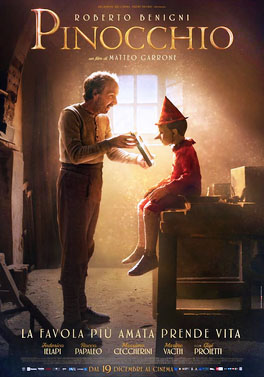Having appeared for the first time in 1881, in the ‘Giornale per i Bambini’ (Newspaper for Children), the world’s most beloved wooden puppet of all time, Pinocchio, continues to charm the young and old alike. The adventures of the puppet whose nose lengthens whenever he tells a lie will be one of the stars of the Christmas 2019 season, with the arrival of a new film by Matteo Garrone. A large exhibition at Florence’s Villa Bardini will also include new editions of the book and awards.
Journalist and writer Carlo Lorenzini used the pseudonym Carlo Collodi for the writing of the immortal story. He was born almost two centuries ago on November 24, 1826, in Florence and published Le Avventure di Pinocchio in 1883. Storia di un Burattino – the story of the Puppet, continues to be a success and attracts the attention in the worlds of film, art, theater and comic books. From 1883 until 1886, Collodi was editor-in-chief of the pioneering newspaper Giornale per I Bambini. He died at the peak of his success on October 26, 1890, one month prior to his 64th birthday, but was immensely gratified to enjoy the enormous success of his puppet character.
For the anniversary of Collodi’s death there was free entrance to the show ‘Enigma Pinocchio, da Giacometti a LaChapelle.’ The exhibition at Villa Bardini in Florence will remain open until March 22, 2020 and includes 45 works such as sculptures, painting, photos and videos by Munari, Giacomelli, LaChapelle, Ceroli, Paladino, Calder, Ontani, Toscani and Benigni.
Roberto Latini has placed ‘Mangiafoco’ with Pinocchio as a character on stage, which recently debuted at the Serra del Sole di Matera in Basilicata. Meanwhile, ‘Pinocchio’ by Matteo Garrone opens in theaters in Italy on December 19th. Filmed in Tuscany, Lazio and Puglia, the movie stars Roberto Benigni as Geppetto and Federico Ielapi as Pinocchio. Finally, Pinocchio will also be on stage in Milan at Teatro Studio Melato until December 22. Rather than just the puppet that wants to become a boy, the well-received adaptation of Collodi’s story is uniquely staged, where many of the characters are also portrayed as puppets.





